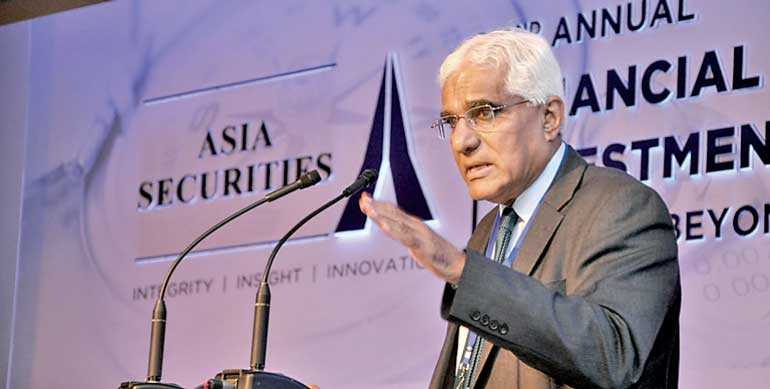Thursday Feb 26, 2026
Thursday Feb 26, 2026
Thursday, 25 October 2018 00:00 - - {{hitsCtrl.values.hits}}
 Central Bank Governor Dr. Indrajit Coomaraswamy
Central Bank Governor Dr. Indrajit Coomaraswamy
– Pic by Lasantha Kumara
By Uditha Jayasinghe
Persisting with structural reforms remains crucial, believes Central Bank Governor Dr. Indrajit Coomaraswamy, who this week dismissed monetary and fiscal slippage with macroeconomic fundamentals remaining sound despite a budget deficit of 5.3% for 2018.
Attempting to set the record straight on Sri Lanka’s economy, Dr. Coomaraswamy gave an extensive rundown of the economy while addressing the Asia Securities Financial Sector Investment Conference 2018 on Tuesday and decisively decimated speculation of an economic collapse.
“The budget deficit this year is going to be 5.3% of GDP, which is higher than the target of 4.8%, but it is almost entirely due to flood and drought relief. In fact the IMF has given us the space for 5.3% because they’ve realised that this relief had to be accommodated. The Government has increased taxes and initiated a fuel price formula so it’s hard to argue there has been slippage.”
A primary surplus for the second consecutive year is also a signal of structural change within the Government but it is essential that policymakers stay the course, he insisted, even though elections are looming. “If discipline is not maintained, then all bets are off.” On the monetary side, Dr. Coomaraswamy pointed out that stakeholders could argue the Central Bank had been conservative with nominal and real interest rates remaining persistently high even though the monetary authority had signalled the tightening cycle was over earlier this year.
However, he stressed that this stance had allowed the economy to grow moderately and protected it from overheating.
"Growth is clearly inadequate. Growth last year was 3.3%, first half of 2018 was 3.6%, and the Central Bank is saying growth will be 4% this year. So while growth is too low, it is on an upward trend, so there is no economic collapse. We need to get growth up. The structural reforms need to be persisted with, but there are signs they are starting to take hold. We had record FDI last year and this year is going to be significantly higher; exports are also going to be a record high in 2018. Things are going in the right direction, certainly not fast enough but there is steady movement up from a low base,” he said.
"Macroeconomic indicators could be better, we cannot continue as a twin deficit country – all that is true. But things have been worse and we haven't collapsed. There are no signs of major turbulence and certainly the impending collapse argument is difficult to sustain."
Inflation has remained well within the Central Bank's target range significantly due to lower food prices with locally-produced food becoming more competitive and inflation data coming off a higher base in 2017. September inflation was 4% according to the Census and Statistics Department while credit growth and monetary aggregates have also been contained, Dr. Coomaraswamy noted, insisting there was no basis for assumptions that inflation was rampant.
"The last Treasury Bill rating was 10.44%, having earlier dipped it has gone up recently but in 2000 it was 18.22%, 2007 19.96%, 2008 19.12%, 2012 11.69%. So the economy has had much higher bond yield rates and has not collapsed. While we would like it to be lower, you cannot argue there is massive turbulence.”
Sri Lanka’s current account deficit this year is expected to be 3% of GDP, higher than anticipated because of gold and motor vehicle imports but these have been addressed through tax revisions. The third reason is oil, but oil price is an element the Government has no control over. The Governor however reiterated that current account deficits had been more than double in the past but the economy had sustained.
In an uncharacteristic move, Dr. Coomaraswamy also responded to criticism that mismanagement was placing the banking industry at risk and statements that during the global financial crisis 10 years ago administration of banks was better.
"I’m not sure how much management was necessary because Sri Lankan banks were not exposed to the banks that collapsed or had serious difficulties in 2008 so one did not have to do much to protect the financial system. It is also difficult to argue that there were no problems in the past. The biggest headache has been the legacy of six insolvent finance companies that were passed down to me and nothing was done about that. It’s a major problem. We live in a highly politicised society and regulatory forbearance related to the politicisation of our society and politics had seeped into the Central Bank. We will handle it; we have a game plan and we are quietly working our way through it – but it is a massive challenge.”